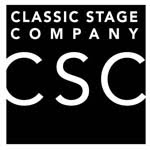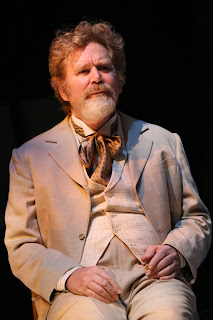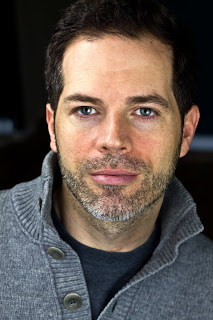Jerry Marsini talks about his character in UNNATURAL ACTS and his experience as co-author.
Who do you play in UNNATURAL ACTS? Can you describe your character's role in the play?
I play Donald Clark who was a third year PhD candidate in 1920 and had no evident connection to Ernest Roberts or his friends. He was drawn into the inquiry as it was winding down because a student, whose identity we don’t know, mentioned in his interrogation that he had once been “approached” by Clark.
In our play, Clark is a man who has learned to survive well inside the system, presenting himself as expected in public, while in private living a life of longing, expressing his sensual self through poetry. Clark is also a character who finds his dignity through the trial, realizing in the end that despite the difficulty, it is better to live his life in truth.
How do you relate or connect with him?
There are so many parallels between Donald Clark and myself. I am a bit older than my cast mates. I lived a life in the closet throughout my formative and college years in the eighties, during the height of ignorance about AIDS, pre-internet, pre-Glee—pre-Will & Grace for that matter. I was very adept at being the person everyone expected, hiding unwanted feelings that were rising in me, but secretly finding an occasional “clue.” Perhaps the most notable connection for me is that I majored in French literature and studied in Paris which afforded the opportunity to travel all over Europe, and I was relieved to learn that as I was exposed to so much diversity, people all over the world were essentially the same.
Please tell us about your role as one of the co-authors of the play. What
has the process been like for you as both a writer and an actor?
It has been a tremendous learning experience because I had never before been part of a collaboration of equal scale. But above all, my experience of creating this play has been overwhelmingly positive, which is due to Tony Speciale’s talent as a director and ability to assemble so many creative people, and then to focus all those strong points of view into a singular vision. And it is always a pleasure to contribute your best to such a group. You know that what you bring to the process will be met with even better contributions, and that alone is inspiring. However, watching it all come together, seeing how everyone makes the project more important than any individual, you realize it is infinitely better because of everyone’s combined talents. That’s a rare gift.
Why do you think this play is important?
It is based on true events from our not-so-distant past, and because similar events are still taking place today, in new forms. Young gay men and women still face ridicule and persecution, and in turn, self-hate as they feel the impulses they are having signify that they are being betrayed by their own bodies. So I hope our play helps audiences analyze any personal prejudices they may have, as well as question the roles each gender is expected to play, which are so deeply rooted in our society. I hope that will help to herald a day when no one bats an eye as little girls and boys show interest in whatever hobbies they choose, make friends with girls or boys and aren't made to feel that either is "right" or "wrong" and come into their own as young adults and begin to pair off in whatever relationship makes them better, happy people.
If you wanted the audience to take away one thing from UNNATURAL ACTS, what would that be?
There is so much information that couldn’t be included in the play for practical reasons. There are so many similar stories that will never be told. I hope the audience leaves the theater with an appetite whet to know more, discover more, with a desire to be more open, more tolerant, with the passion to love more, to care more, and with the courage to live more, to be themselves, openly.






